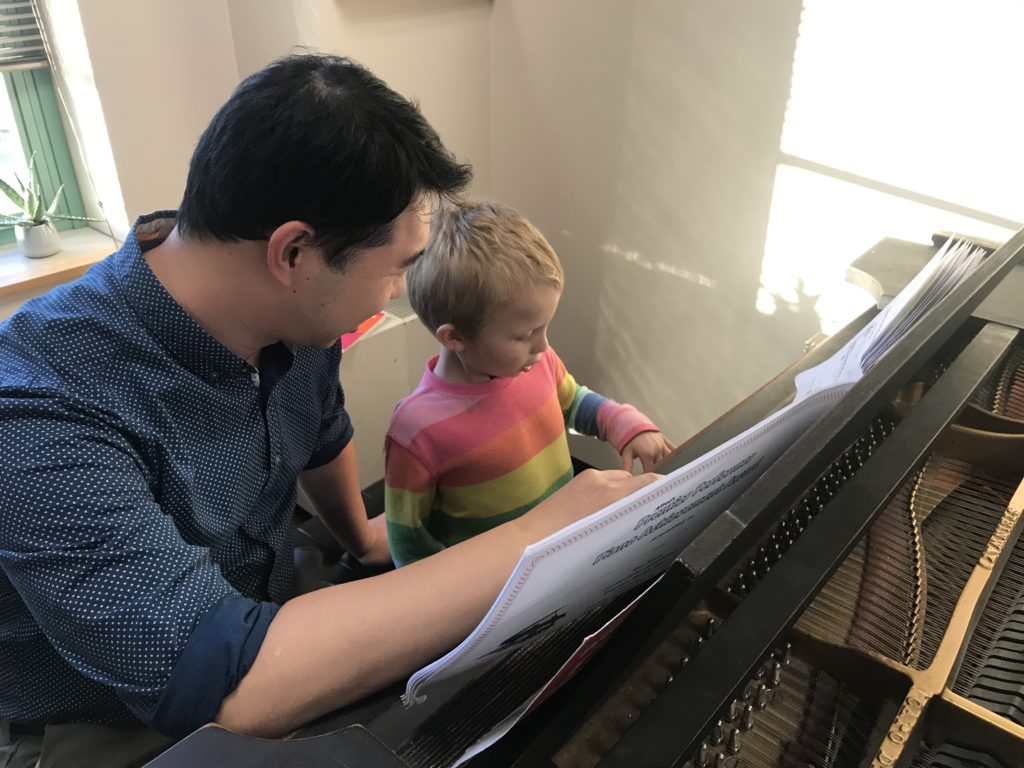Piano Pedagogy

Are you passionate about piano teaching? UMKC offers two graduate degrees to help launch your teaching career. Both degrees include a combination of supervised teaching experiences and performance opportunities that will help you grow as an artist-teacher. For questions about the piano pedagogy program, email Dr. Christopher Madden at cmadden@umkc.edu.
Degrees
Master of Music: Performance – Piano Pedagogy emphasis
Designed for students with a strong performance background, the M.M. Performance – Piano Pedagogy provides students extensive performance opportunities while they develop their teaching skills. In addition to Piano Pedagogy coursework, students take courses in Collaborative Piano and Keyboard Literature. Two recitals are required for this degree: a solo recital and a lecture-recital.
Master of Arts: Music – Piano Pedagogy emphasis
Ideal for current teaching professionals and rising seniors, the M.A. Music – Piano Pedagogy degree allows students to refine their pedagogical approaches while maintaining a broad course of study. In addition to pursuing a concentration in Piano Pedagogy, students have 8 elective credits to explore additional areas of interest. By the end of the degree, students synthesize new knowledge in a culminating final project, which could entail a research paper, recital, or professional presentation.
Coursework
Piano Pedagogy I (CONSVTY 325/5325)
This course provides an introduction to piano pedagogy by exploring topics including average-age piano methods, teaching strategies for a variety of students, technique, learning modalities, motivation, andragogy, business practices, and technology for teaching.
Supervised Teaching I (CONSVTY 325A)
Co-requisite with CONSVTY 325. After exploring various average-age piano methods, students will choose a preferred method and teach 12 weekly 30-minute lessons to an average-age student enrolled in the Conservatory Academy.
Piano Pedagogy II (CONSVTY 326/5325)
In this course, students examine pedagogical topics related to intermediate piano students, including intermediate repertoire, technical considerations for intermediate students, effective practice strategies, sight reading, and memorization. After reading through a variety of standard repertoire from Levels 3-7, students will compile an anthology of intermediate pieces with annotated practice guides. They will also perform selections during an in-class recital.
Supervised Teaching II (CONSVTY 326A)
Co-requisite with CONSVTY 326.
Group Piano Pedagogy (CONSVTY 5591E)
During the group teaching segment of the course, we will discuss cooperative learning theory as it applies to group piano instruction. Students will be supervised while they teach segments of a group piano class.
Advanced Piano Pedagogy (CONSVTY 5592E)
This course focuses on topics pertaining to early-advanced through advanced piano students. Broadly speaking, the semester is divided into four categories: 1) best-practices in pedagogy; 2) interpretation; 3) technique; and 4) professional skills. Within each category, readings, videos, recordings, and other media are used to convey important concepts. In addition to weekly class discussions, this seminar includes hands-on teaching experiences with advanced students, both in a private lesson and masterclass setting.
Teaching and Learning in Music (CONSVTY 5445)
This course explores the fundamental principles of music learning and provides opportunities for students to practice applying those principles to music teaching. Students will analyze their effectiveness at structuring meaningful learning experiences when teaching others in authentic settings (by analyzing videos from rehearsals, lessons, or classrooms) and when structuring learning experiences for themselves (by analyzing videos of practice).

